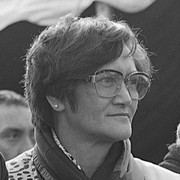
Tūngia Baker
Born and raised in Ōtaki in 1939, Tūngia Baker was a multifaceted talent— actor, artist, and a dedicated advocate for Māori voices in the arts, theatre and film.
Baker's journey towards championing Māori representation in the arts began after she won an American Field Service Scholarship in 1958, and travelled to West Bend, Wisconsin. The experience shaped her understanding of cultural diversity: "I realised that the way Māori people live is okay. I am now able to confront people who are uncomfortable with different cultural traits."
Baker first got involved in contemporary Māori theatre as it emerged in the 1970s with Rowley Habib's group Te Ika a Maui Players. In 1976 she acted in Habib's landmark production Death Of The Land. The courtroom drama addressed the issue of Māori ancestral land sales, marking one of the first times a Māori playwright won widespread recognition. Baker reprised the role when Death Of The Land was adapted for a 1978 teleplay.
In 1979 Baker played the role of Reta in The Gathering, another pioneering Rowley Habib drama exploring Māori themes. The Gathering explores the tensions felt at a tangi held in a suburban house. It was the first Māori-authored drama written specifically for television.
In the mid 1980s, Baker joined Barry Barclay, Wi Kuki Kaa, Anne Keating, Tama Poata and Karen Sidney to form Te Manu Aute, a collective of Māori filmmakers. They advocated for content "by Māori, for Māori, with a Māori perspective and under Māori control". The work started by Te Manu Aute evolved into current Māori screen advocacy group, Ngā Aho Whakaari.
In 1986 Baker took on one of her biggest screen roles. Television series Open House focussed on a community house in a working class suburb. Baker played Ngahuia Mitchell, who at one point helped run the house. The Mitchell family were one of the earliest Māori families to play a central role in an ongoing television drama.
In 1993, Baker acted in Jane Campion’s Academy Award-winning The Piano. Baker's character of Hira appears in a memorable scene where a waka is pushed across a beach into the sea. In moko and top hat, she offers a karanga, or call of farewell. Footage of the cast and crew preparing to film the sequence can be seen here.
Baker named the Taki Rua Theatre, a long-running kaupapa Māori theatre company in Wellington, and acted in many of their productions through the 1980s and 90s.
Aside from her contributions to film and theatre, Baker co-founded Māori women's artists' collective, Haeata. In her own artistic practice, she worked with flax and weaving techniques. Her work was profiled in a 1983 episode of arts series Kaleidoscope. In 1984, she coordinated the New Zealand component of the fourth South Pacific Festival of Arts in Noumea.
From 1988 to 1991 she hosted the radio programme Te Kupenga Kōrero on Te Upoko o Te Ika in Wellington.
After moving to the West Coast in the 1990s, Baker got involved in cultural group Puhake Ki Te Rangi and whale researchers Project Tohora Trust. In 1996 she co-wrote and co-produced and the documentary A Whale Out My Window, about Southern Right Whales.
Baker returned to Ōtaki in 2005, where she passed away on 27 July. Pearl Sidwell, one of her four daughters, described her as "a woman of words, an educator who has left behind a legacy in her work".
Ko tōku reo taku ohooho, ko tōku reo taku māpihi maurea.
Profile written by Alexandra Paterson; published on 20 November 2023
Sources include
Photo of Tūngia Baker by and courtesy of John Miller
Anne Keating
Anne Te Māhia Sidwell (daughter)
Kay Blundell, ‘Woman of words’ left legacy in karanga work’ - The Dominion Post, 28 July 2005
Mark Derby and Briar Grace-Smith, 'Māori theatre – te whare tapere hōu' Te Ara website. Loaded 22 October 2014. Accessed 20 November 2023
Judith McCann, ‘Remembering Tungia Baker’ - WIFTNZ Magazine, Summer 2005, page 8
Kahu Kutia, 'Dance with my coloniser, dance with my culture' Radio New Zealand website. Loaded 1 June 2017. Accessed 20 November 2023
Paul Madgwick, 'Māori actress dies' - The Press, 27 July 2005
Unknown writer, 'Tūngia Baker' - Tu Tangata, 1 October 1984, page 13
Unknown writer, 'Tūngia Dorothea Baker' Kōmako website. Accessed 20 November 2023
Unknown writers, 'Tungia Baker' Wikipedia website. Accessed 20 November 2023